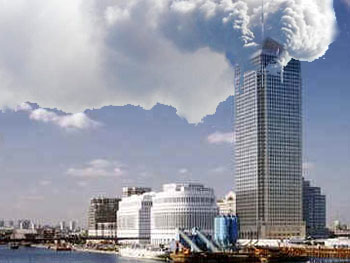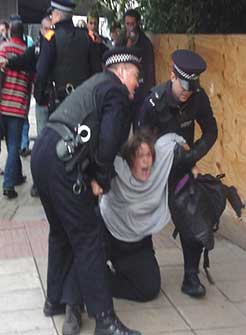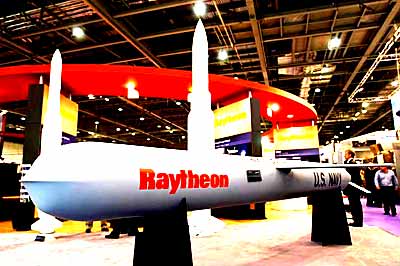|
from 28 september 2003 blue vol II, #98 |
|

anon.
 This year's 'fair' (or 'exhibition', as the
organisers like to call it, likening it to a Motor Show except with
weapons instead of cars), was the first since September 2001. On
the 11th September that year, a day which has passed into history
for different though not unconnected reasons, another mass
protest was organised, calling itself a 'Fiesta for Life Against
Death'. The police soon surrounded and suffocated that carnival, with
the most effective actions being carried out by smaller affinity
groups that played cat and mouse with arms dealers and the police paid
to protect them.
This year's 'fair' (or 'exhibition', as the
organisers like to call it, likening it to a Motor Show except with
weapons instead of cars), was the first since September 2001. On
the 11th September that year, a day which has passed into history
for different though not unconnected reasons, another mass
protest was organised, calling itself a 'Fiesta for Life Against
Death'. The police soon surrounded and suffocated that carnival, with
the most effective actions being carried out by smaller affinity
groups that played cat and mouse with arms dealers and the police paid
to protect them.
This year, DSEi was held again in the ExCel Centre, the sort of heavily defended fortress where world leaders usualy opt to meet these days. ExCel is in Newham, one of the poorest areas in Europe, but whose council is actually subsidising the centre since it runs at a loss. As before, there was a concerted attempt to inform people about what was happening in their area, and to ask them for their support for the protests, an attempt which was largely successful, even though the protests saw their roads blocked, trains cancelled, their housing estates turned into semi-militarised zones and their children banned from spending breaktimes outside in case they might get to speak to a protestor. (That last part is true, as a friend of mine was threatened with arrest by a policeman for talking to kids through a gap in the fence, but who was able to bring them onside pretty quickly before being hustled away. Apparently said policeman was only enforcing the orders of the headteacher with just a little too much zeal. Another school, one which has been I think supported financially by ExCel in the past, was turned into a command centre by the police, who had thousands on duty and who would eat up almost £2m in taxpayers' money for their few day's work.) So having learnt a little from previous action frustrations, this year there were multiple meeting points, not to mention two separate days of action, the first being with non-violence guidelines, the second (September 10th) being more of a 'shut the death fair by any means possible' sort of a day. the media, having covered the event and the issue in some detail in the run-up to the week, pronounced the first day as a failure since nothing very destructive or intrusive happened. Three people were arrested first thing in the morning for throwing red paint across the arrival route of the UK's beleagured Defence Secretary Geoff Hoon. (Actually, over fifty people had been arrested in the weeks leading up to the event for various very inspiring actions including occupying the office of the event organisers Spearhead, blockading ExCel with arm-locked human bodies on the first day of the arrival of hardware at the site, and the temporary blockading partly with Toys'R'Us dinghies of the harbour alongside ExCel, thereby preventing the entry of Navy warships on sale at a knockdown price to anyone able to produce the cash.) The second day was more chaotic, with the planned and announced simultaneous blockading of one entrance and storming of another, in order to give people a choice of tactics, and a street party towards the end of the day. None of these things happened exactly as planned, a more fluid road-blocking, train-stopping, arms dealer haranguing rhythm emerging pretty organically, with individuals and affinity groups moving to a vulnerable point here, or an inspiring, samba-fuelled blockade there, then slipping away before the police could surround the crowd, although that did happen more towards the end of the day. By climbing on top of trains on various lines, groups of two or three people forced its complete shutdown on a few occasions, quite a strain on people getting to or from work or picking the kids up from school, but nothing really compared to the misery meted out by the products displayed in the air-conditioned splendour of the ExCel Centre. One woman managed to stay on top of a DLR train for over an hour by threatening to jump off if anyone tried to bring her down. Another two were brought down by professional climbers who the police must have booked for the days long in advance. These last two were received rapturous applause as they were led out of Canning Town station by British Transport police. As they were guarding their van with their newly arrested prisoner, I asked a transport cop what he thought of the arms trade. 'Well I'm an ex-squaddie (soldier) myself, so I'm biased,' he replied. 'But doesn't that mean you're more exploited than most by the people who send you off to war, not to mention the dealers who make big money supplying both sides?' I replied, (though I probably said it more messily at the time.) From that point, we seemed to have found something to agree on... Arms dealers and the various others who were looking for business at ExCel, were often forced to run the gamut of angry protestors, most of them managing somehow to ignore the arguments and insults, at least outwardly. A group of probably Irish military maintained an almost surreal level of stony-faced impassivity as people told them what scum they were, and someone else put a bit of a dent in the roof of their people carrier with his boot. The most common justification for their activities was that the UK needs to defend itself - after all, where would we have been in 1939 without a military presence? Others seemed to think the fact that we were either without jobs or away from them for the day utterly invalidated our arguments and actions. So you can tell they spend more time doing business with eachother than crafting devastating moral justifications for what they do, then. It seemed necessary to make our feelings known to these visitors, since if we hadn't stopped them from getting inside (as did happen to a few), it was worth making their day as uncomfortable as possible, perhaps to keep them from coming back during the rest of the week, and perhaps to build the pressure on ExCel, Spearhead and the UK government to force them to shut the damn thing down...eventually. Although bubbling over with righteous indignation had a certain satisfaction, it was more challenging but also more rewarding to chat to local people and those stuck at tube and train stations, and to try to explain what was going on since to many it was just chaos. Pretty much everyone was in favour of the protests, except for one young bloke who wanted to beat me up, really badly - but that was probably as much to do with my loud mouth in supporting the two women standing on the DLR train than the disruption of their journey. Even many drivers stuck in their cars watching people blocking roads with fencing and samba seemed to understand what it was about and take it as a bit of necessary and even entertaining early evening street theatre. Employing a combination of aggression and numbers, the gloved and helmeted police began gradually corralling a previously wild, mercurial and tactically-conscious crowd. They were mostly free from the cop's kettling antics by 8pm, but the day's arrests stood at well over double figures, and there would be more the following night (September 11th no less) when the dealers' gala hotel dinner was noisily blockaded for several hours until violently broken up by ridiculous numbers of police. No doubt many of them oppose the arms trade once they get home and pull off their heavy boots, but that's no comfort if those boots have been stomping on protestors all day.) On the day following the main day of actions, the newspapers were filled with news that the police were being taken to court for illegally using Terrorism Act legislation to stop, search and even arrest protestors. So while we had the satisfying knowledge that the Home Secretary and the obsequious police chief responsible for briefing the media on such events squirming and digging their way out of a big hole, the events of the day and the issue of the arms fair taking place at all were a little hidden. It was good to see, though, a well-established campaigning group like Liberty throw their weight behind the campaign to stop the state and the police from using the 'war on terrorism' to muzzle much-needed protest. The media handed over far more space to events in Cancun, where the WTO meeting was running into problems, and protestors were still reeling from the suicide of the Korean farmer opposite the police lines. It was a real missed opportunity that more wasn't made of the links between the WTO and DSEi, between free trade and the arms trade. The people behind Disarm DSEi were strongly focussed on the logistics of shutting the damn thing down, and their occasional attempts to hook up with the London Peoples' Global Action support group - which has been active in the past in keeping the flame of international webs of resistance burning - had been frustrated by that group being in one of its non-meeting phases. On the other hand, friends from mainland Europe had answered the international call out for DSEi by turning up to join in with the action, and those webs of resistance are still extending and strengthening in many parts of the world, especially in eastern Europe. 
Sitting exhausted on the tube on the way to the pub in the early evening of September 10th, already hoarse from an overload of righteous shouting, arguing and explaining, I couldn't resist the chance to sit next to two well-lunched besuited types. 'Have you been to ExCel today?' I asked, politely. 'Why yes,' says one. His friend, noticing that I've been looking at an invitation for an evening party in his hand, slowly pockets it. 'Which company are you with?' 'Raytheon' (one of the US' largest defence and aerospace corporations.) 'You mean the company that's making a mint from the war on terror?' A wry smile from him. 'Well, I suppose so.' 'You make massive donations to the Republicans and the Democrats, don't you?' His friend is getting uneasy; my friends are starting to throw in their arguments from other parts of the carriage. The guy who's decided to try to make things clearer for me tries to calm me with a gentle declaration: it's OK for the US government to be both the main customer for Raytheon's products and the main regulator of a very heavily regulated industry, since it's not the same part of the government making those decisions. Baffled by the lameness of this argument - as usual, we have the best arguments, they have to make do with the cops, the cash and the firepower - I decide to dispense with restrained debate. It's almost too late, as the non-speaking friend has noticed with great relief that the train has arrived in a station - any station - and that they're both getting out, now. 'People are disgusted by what you do!' I shout after them. 'And what's been happening at ExCel is an abomination!' Unsure as to whether the swiftly departing dealers have been suitably impressed at my use of a five syllable word in such a situation, we try to explain what that was all about to the rest of the commuting passengers, but they want none of it, and the usual British public transport self-restraint and silence above all else is restored. A little later, as we're about to jump onto an escalator, we see a London Underground sign: 'Delays are occurring on the Jubilee Line. Service has been restricted on the advice of the police', after which someone had added 'as people are shutting the DSEi arms fair'. Well, we didn't shut it here and now, but we got closer than we ever have before, the issue of arms fairs and the arms trade itself is being debated all over the place, and I find it hard to believe that ExCel will want to go through another week like this come the next DSEi in 2005. It'd be a good idea for all of us who were involved in any way this this week to think of quick and simple ways to keep the pressure up on ExCel, Spearhead and the UK government after this year's events. They certainly need to know that wherever they decide to hold it next will become the site of as determined, fluid, creative and angry actions as greeted them this year. – Anon
|
|||
